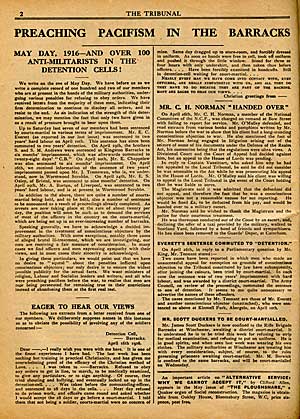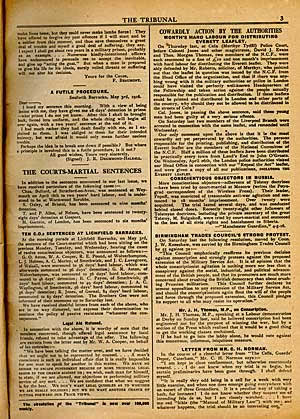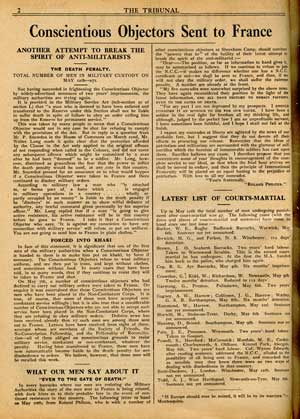
| HOME | TRIBUNAL HOME |
May 1916
For the members and comittee of the No Conscription Fellowship, May 1916 was the first indication of the task ahead of them. Reports of COs at Tribunal and Court Martial - vastly more than the NCF had anticipated - began to flood into branch offices, and from there to London and Manchester. A dedicated volunteer staff began the incredible job of updating records on each individual CO, detailing where they were, when they were expected to next be in public and what was happening to them. The four May 1916 issues of the Tribunal reflect this effort, with most of the available space dedicated to updates on individual COs and selected articles from other CO-sympathetic news sources.
May 4th: “PREACHING PACIFISM IN THE BARRACKS”
The month of May 1916 begins with what is, in retrospect, an almost charmingly naive piece on COs in prison. The article discusses the at the time unprecedented numbers of COs in prisons and barracks guard rooms around the country - over 100!
 While “over 100 anti-militarists in the detention cells” is not a cheerful sub-header by any means, it shows us a few important things about the Tribunal and the NCF itself. The surprise that comes through in the article that so many men were being imprisoned shows that COs were not at all sure what could happen to them for refusing to be conscripted. In early 1916, conscription was a new phenomenon and a considerable shock to the British public. The government itself were still not sure how to deal with COs - and arguably would not be until the second world war decades later. For the NCF newspaper, which had predicted harsh punishments and a hard fight ahead, these first two year hard labour sentences were a sinister indicator of what was still to come.
While “over 100 anti-militarists in the detention cells” is not a cheerful sub-header by any means, it shows us a few important things about the Tribunal and the NCF itself. The surprise that comes through in the article that so many men were being imprisoned shows that COs were not at all sure what could happen to them for refusing to be conscripted. In early 1916, conscription was a new phenomenon and a considerable shock to the British public. The government itself were still not sure how to deal with COs - and arguably would not be until the second world war decades later. For the NCF newspaper, which had predicted harsh punishments and a hard fight ahead, these first two year hard labour sentences were a sinister indicator of what was still to come.
The article ends with a short note; “In many cases we find officers and men expressing sympathy with their [the CO] views, and in many cases their sincerity is acknowledged”. These thanks given in the Tribunal to sympathetic soldiers are a recurring theme. No issue or article in the Tribunal’s three year run attacks ordinary soldiers. By far outweighing even discussions of the incompetence of the upper ranks of the military are notes such as this one - small thanks for acts of human kindness, consideration and understanding displayed by soldiers to the COs they encountered.
May 11th - News and reports
A common feature in issues of the Tribunal that we haven’t yet covered are the news reports of letters, protests and arrests of people who were not COs, but were supportive of the CO cause. In May 1916 several issues carried these reports, but the May 11th issue is especially important.
Two major reports are important to our story. Firstly, the “COWARDLY ACTION BY THE AUTHORITIES” reports on one of the first prosecutions of NCF members for distributing leaflets. David Evans and Morgan Thomas were arrested, fined and imprisoned for handing out what became known as the “Everett Leaflet”. This leaflet was produced by the Central Offices of the NCF, and discussed the case of Ernest Everett, the first CO to be arrested. It stated that “Ernest Everett, an individual Conscientious Objector, said, and provided by his actions, that no human power could ever compel him to form part of a military organisation. Such a man can be respected”. The purpose of the leaflet was to inform the public about what kinds of men became Conscientious Objectors, and what had happened to them. The writer, Bertrand Russell, was soon on trial for it’s publication.
 David and Morgan were arrested under the Defence of the Realm Act, apparently for trying to stop men from joining the army. What they had done was perfectly legal, and they were defended at great length by Bertrand Russell in his own defence later in the year. The defence hinged on the content of the leaflet - was stating the punishment inflicted on a CO really “injurious to recruiting”? Or was it the existence of COs that discouraged others from joining the army? In either case, there was no legal ground to prosecute any of the three men. The two trials exposed the hypocrisy of the government as, with no legal defence, David Evans, Morgan Thomas and Bertrand Russell one by one found themselves in prison.
David and Morgan were arrested under the Defence of the Realm Act, apparently for trying to stop men from joining the army. What they had done was perfectly legal, and they were defended at great length by Bertrand Russell in his own defence later in the year. The defence hinged on the content of the leaflet - was stating the punishment inflicted on a CO really “injurious to recruiting”? Or was it the existence of COs that discouraged others from joining the army? In either case, there was no legal ground to prosecute any of the three men. The two trials exposed the hypocrisy of the government as, with no legal defence, David Evans, Morgan Thomas and Bertrand Russell one by one found themselves in prison.
Prosecutions for distributing leaflets were becoming more common as the year went on. While this report discusses one of the first, the NCF and staff of the Tribunal would soon be rocked by further arrests in June and July.
“CONSCIENTIOUS OBJECTORS IN RUSSIA” highlights the fates of around 50 conscientious objectors in Russia. Conscription had existed throughout the war in Imperial Russia, though unlike Britain there were no provisions for Conscientious Objectors. The differences in the CO experience in the two countries are stark - the Tolstoyan COs in Russia are tried behind closed doors and sentenced to exile in Siberia, which would no doubt be a death sentence for many. The experiences of Russian COs were very important to many men in Britain. Hundreds of British COs had fled religious and military persecution in Russia and come to Britain hoping that they had escaped militarism and conscription. Many would still have family in Russia. The brutality of Russian punishments also reminded many COs of the hollow justification for the First World War. In a war fought supposedly to “destroy Prussian militarism”, why was Britain fighting alongside the repressive and autocratic regime of the Tsar’s Russia?
May 18th: “Conscientious Objectors Sent to France”
Of all the articles in the May 1916 issues of the Tribunal, this one is the most important. In early 1916, the programme of coercion and violence designed to force COs into combatant roles in the army failed as soon as it began and, by April, the military authorities were becoming desperate. The Tribunal writes:
“On May 7th a number of Conscientious Objectors who had declined to carry out military orders were taken to France”
Some of these men were “supposed” to be there, COs who had accepted Non-Combatant status and were being shipped to labour battalions in France. Some, however, were not. In the May 18th issue, the NCF believed that 17 Absolutist COs - men who could not and would not accept any form of military role. What would happen to them was difficult to imagine, but the newspaper made plain the worst-case scenario:
“Having been transferred to France, these men have now automatically become liable for the death penalty for any disobedience to orders”
The determination of some of these COs was clearly shown to the readers of the Tribunal with a letter from Rowland Philcox, a CO then held in Shoreham Camp:
“My five comrades were somewhat surprised by the above news. They have again reconsidered their position in the light of the latest information and all have decided to remain faithful even to the gates of hell”
Publicising this story was an integral part of the NCF’s plan to rescue what would become known as “The Frenchmen”. The next stages were up to supporters in parliament and beyond. June 1916 would become a difficult time.